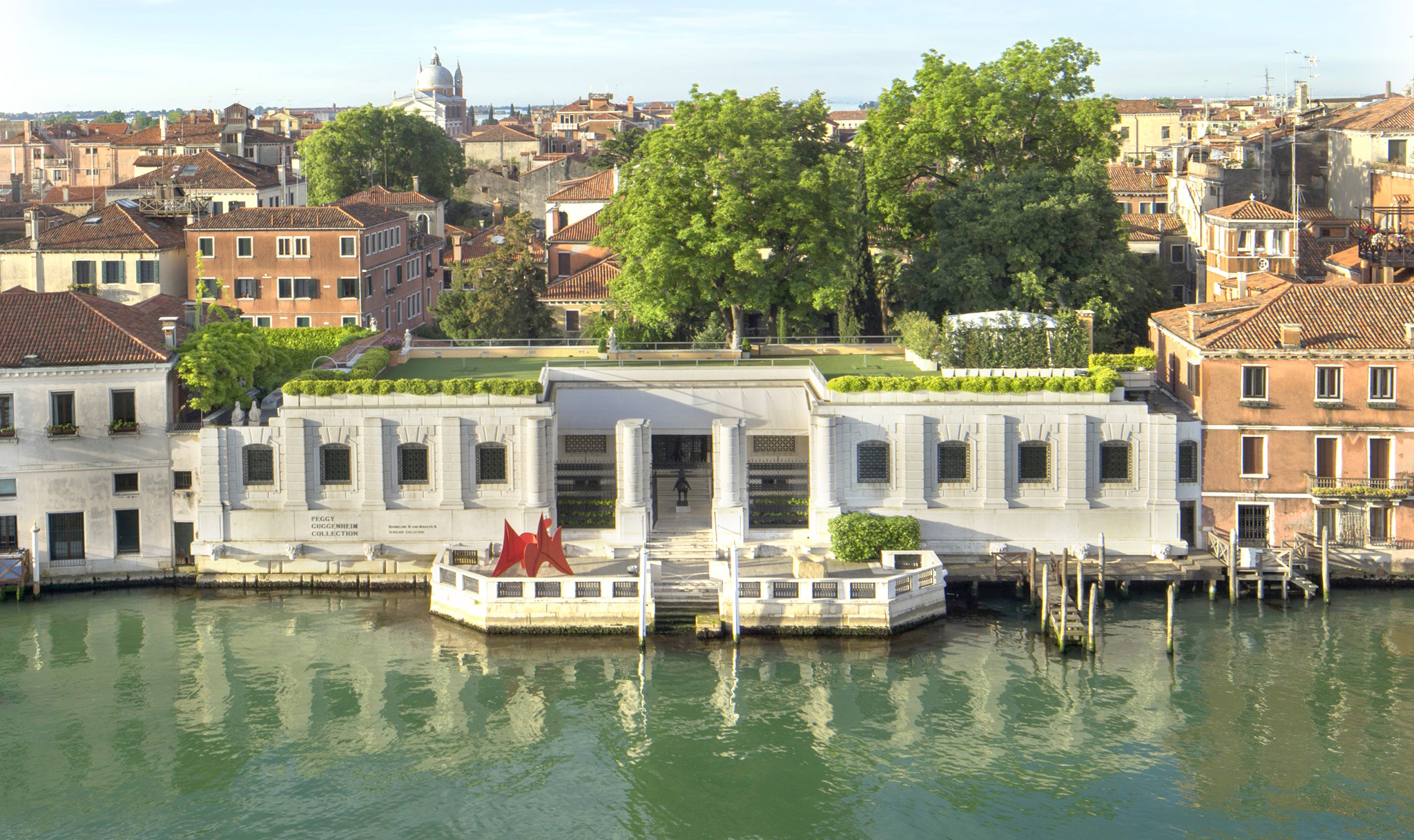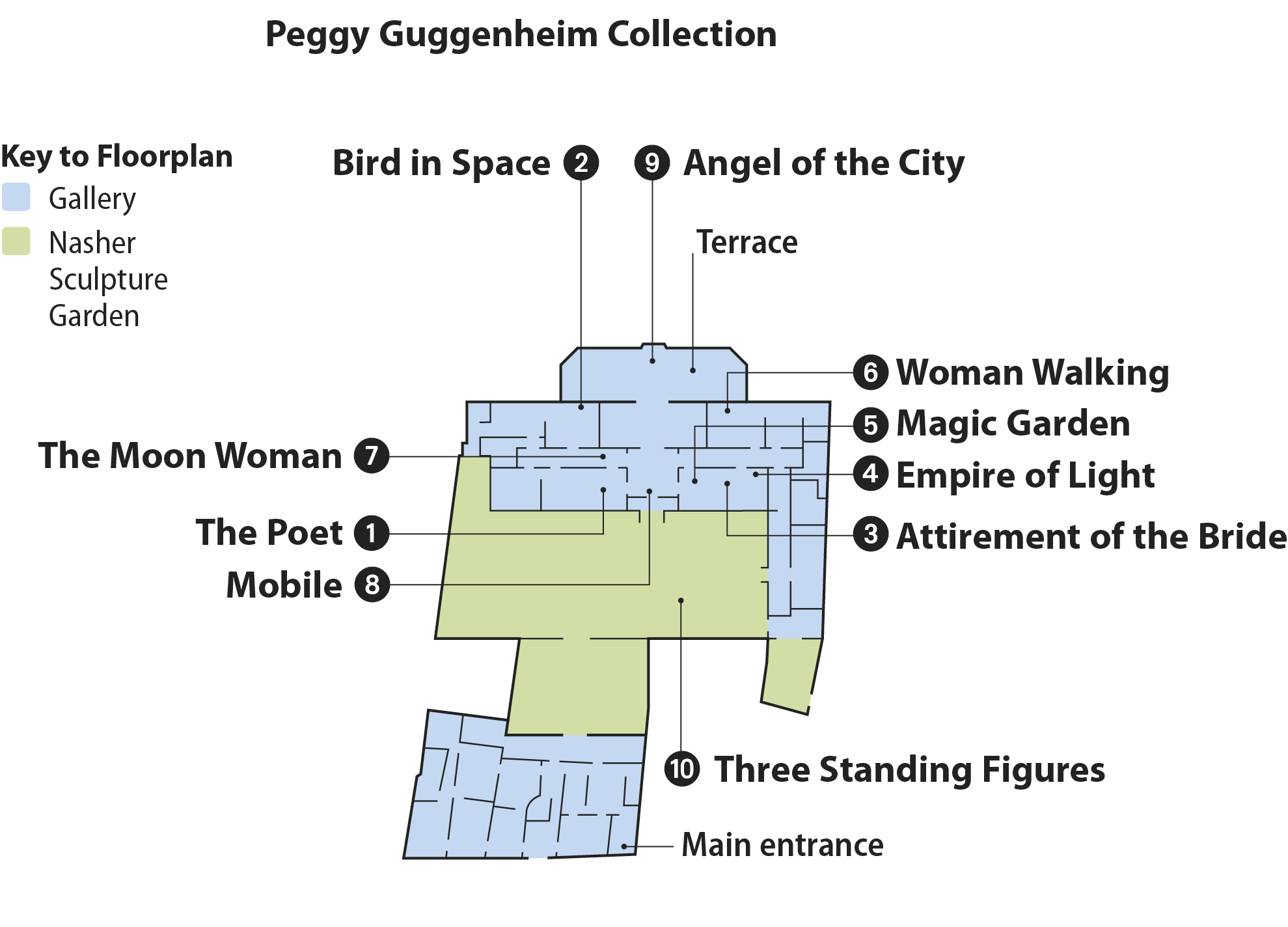
PEGGY GUGGENHEIM COLLECTION
The delightfully spacious, light-filled Collezione Peggy Guggenheim is home to works by more than 200 contemporary artists representing powerful avant-garde movements such as Cubism, Futurism and Surrealism. The landmark collection, put together by its far-sighted namesake, is housed in the 18th-century Palazzo Venier dei Leoni, known as the “unfinished palace” because of its one-storey construction. As well as the wonderful works of art on display inside the gallery, there is also a striking sculpture garden and the former home of Peggy Guggenheim to visit.

Peggy Guggenheim Collection
NEED TO KNOW
![]() Fondamenta Venier dei Leoni, Dorsoduro 704 (2nd entrance Calle S Cristoforo, Dorsoduro 701) • 041 240 54 11 • www.guggenheim-venice.it • No flash photography • Open 10am–6pm Wed–Mon; Closed 25 Dec • Adm €15; audio guides
Fondamenta Venier dei Leoni, Dorsoduro 704 (2nd entrance Calle S Cristoforo, Dorsoduro 701) • 041 240 54 11 • www.guggenheim-venice.it • No flash photography • Open 10am–6pm Wed–Mon; Closed 25 Dec • Adm €15; audio guides
- Take a break in the coffee shop or on the café’s shady verandah for a light snack or a meal.
- Enjoy the view from the terrace, which looks onto the Grand Canal.

1. The Poet
A wonderful starting point is this portrait (1911) by legendary Spanish artist Pablo Picasso (1881–1973), from his early Cubist period. The figure is executed from a limited palette of ochre and dark browns.
2. Bird in Space
This polished brass sculpture (1932–40) was once classified by US customs as a “stair-rail” and was therefore subject to duty. Its creator was Romanian artist Constantin Brancusi (1876–1957).
3. Attirement of the Bride
This portrayal (1940) of an orange-robed bride assisted by mutant animals and humans is by Max Ernst (1891–1976). The German Surrealist was married to Peggy Guggenheim from 1942 to 1946.

Max Ernst’s Attirement of the Bride
4. Empire of Light
Magical light effects see darkened trees and a house silhouetted by a street lamp against a contrasting daytime sky with fluffy clouds in this work (1953–4) by René Magritte (1898–1967). The Belgian Surrealist was renowned for his eccentric subjects.
5. Magic Garden
This deliberately child-like piece (1926) by Paul Klee (1879–1940) features blurry shapes and sketched-in faces and buildings.
6. Woman Walking
This serene elongated form of a truncated female figure (1932), apparently inspired by Etruscan design, is the recognized trademark of the Swiss artist Alberto Giacometti (1901–66), a short-term participant in the Surrealist movement.

Alberto Giacometti’s Woman Walking
7. The Moon Woman
This vibrant canvas (1942) starring a skeletal stick figure with an odd, padded curve is an early work by Jackson Pollock (1912–56), pre-dating his famous “drip” technique.
8. Mobile
This simple masterpiece of movement (1941) by Alexander Calder (1898–1976), which gave its name to all mobiles, hangs in the atrium of Guggenheim’s house.
9. Angel of the City
Set on steps leading to the terrace, this bronze horse and rider (1948) by Italian sculptor Marino Marini (1901–80) greet passing boats.
10. Three Standing Figures
Beautifully placed in the Nasher Sculpture Garden, these sculptures (1953) by Henry Moore (1898–1986) were inspired by Italian bell towers.
PEGGY GUGGENHEIM
This heir to a mining fortune (1898–1979) first came to Europe in 1921, quickly fitting into Bohemian Paris. Resolving to “buy a picture a day”, she amassed a contemporary art collection before she made Venice her home in 1947. She is fondly remembered by locals here for her faithful dogs and for owning the city’s last private gondola.